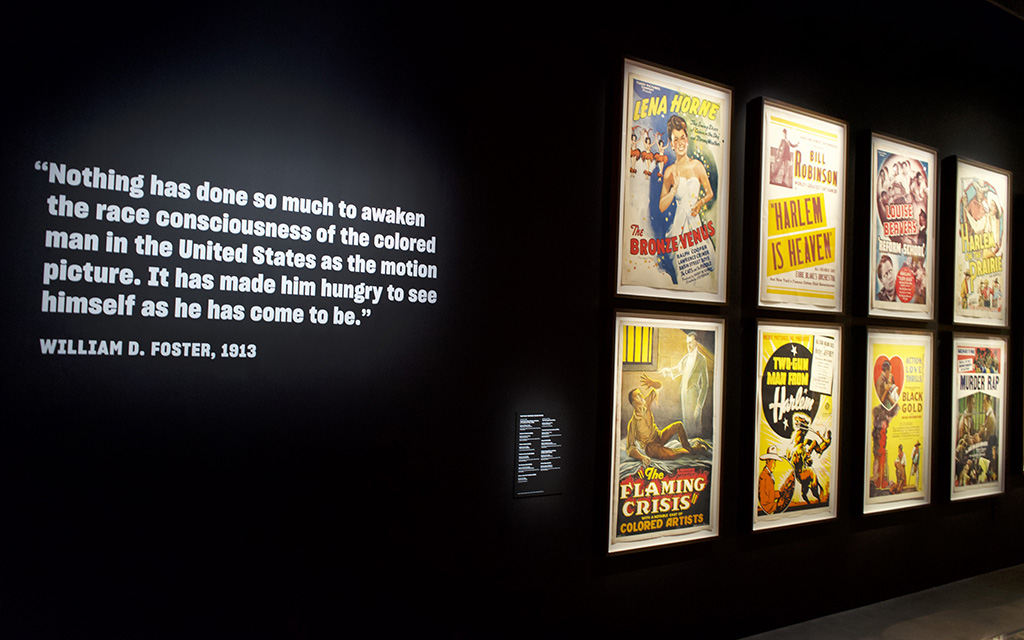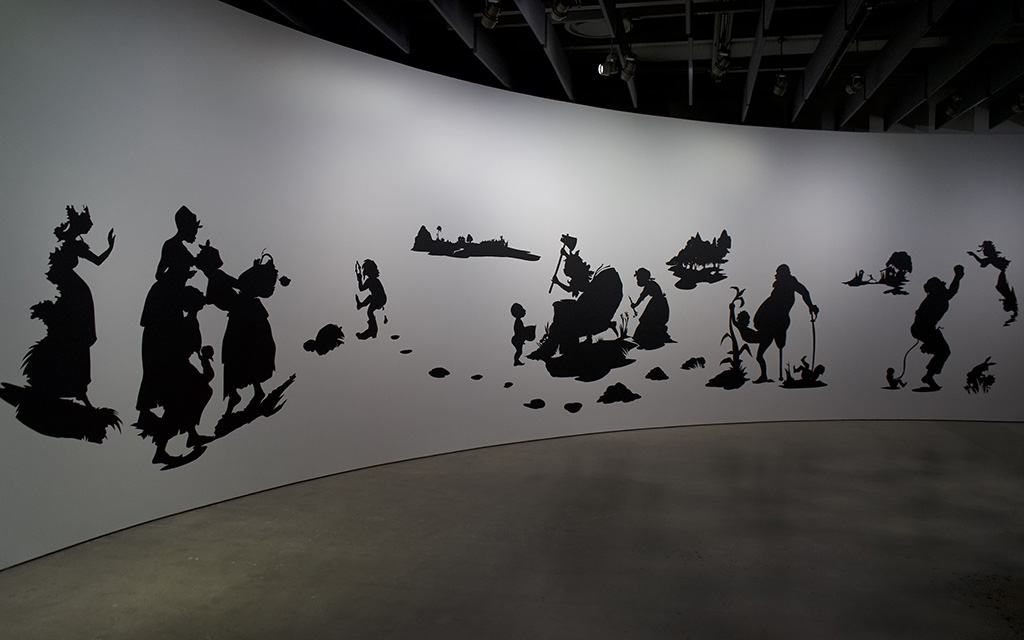Museum guests point and admire the photos of iconic Black stars like Sidney Poitier and Hattie McDaniel. It was part of an exhibit on early Black films at the Academy Museum of Motion Pictures in a photo taken Feb. 4, 2023, in Los Angeles. (Photo By Ayana Hamilton/Cronkite News)

A gallery of Black film posters were plastered throughout the exhibit at the Academy Museum of Motion Pictures in a photo taken Feb. 4, 2023, in Los Angeles. (Photo By Ayana Hamilton/Cronkite News)

Kara Walker, The End of Uncle Tom and the Grand Allegorical Tableau of Eva in Heaven, 1995. This silhouette installation by Walker exposes the violence implicit in Harriet Beecher Stowe’s 1852 antislavery novel “Uncle Tom’s Cabin.” It’s on display at the Academy Museum of Motion Pictures in a photo taken Feb. 4, 2023 in Los Angeles. (Photo By Ayana Hamilton/Cronkite News)
LOS ANGELES – They only each run about three minutes, but in that short time “soundies” are helping to preserve Black history from decades ago.
Soundies were short films often depicting a musical performance that could run before or after feature films in movie houses around the nation.
The reels, many of which were made in the 1940s, typically featured musicians of all races, but they are particularly significant for preserving performances from Black luminaries like Louis Armstrong, Dorothy Dandridge, Cab Calloway and Fats Waller in the prime of their careers.
For Black performers, soundies were an opportunity for exposure beyond nightclubs to reach diverse audiences. But all too often, they helped perpetuate racist stereotypes of the era.
Soundies are part of an Academy Museum of Motion Pictures exhibit in Los Angeles called “Regeneration: Black Cinema 1898–1971.” It features rarely-seen film excerpts restored by the Academy Film Archive.
There are over 225 original objects to view and an important chunk of that collection consists of soundies.
“There is such a rich history that is just, I wouldn’t say necessarily hidden, but if we don’t pull it out, it’s going to be lost,” said Susan Delson, a film historian who has taken a deeper look into the role Black performers play in soundies. “With these soundies, if you watch them with 2023 eyes, they’re going to look weird, and a lot of them are going to look racist. They’re sometimes a combination of both.”
On Delson’s website, there’s an online jukebox of soundies that were overlooked in the Black entertainment industry in the 1940s.

The Regeneration exhibit at the Academy Museum of Motion Pictures in a photo taken Feb. 4, 2023, in Los Angeles brings back what was lost in American film history as it elevates the Black artists who contributed to it. (Photo By Ayana Hamilton/Cronkite News)
The Regeneration exhibit brings back what was lost in American film history as it elevates the Black artists who contributed to it. It runs till July 16.
Kyle Bowser, senior vice president for the NAACP’S Hollywood Bureau, urges a careful approach in resurrecting lost or forgotten history.
Bowser said it should be done truthfully, not in a way that reinforces myths, stereotypes, and misinformation because every form of media has its relationship and history.
“Much of what has been recorded in history about the African American experience is very distorted and was originally composed to put forth a particular narrative that was favorable to points of view that weren’t necessarily accurate,” Bowser said.
Maya Cade, creator and curator of the Black Film Archive, launched a series early February called “Try a Little Tenderness” focusing on movies featuring Blacks that were believed to have been lost.
“I wanted to use ‘Tenderness’ as a guide through Black cinema’s history,” Cade said. She hopes the archive will continue to make itself visible to generations of people.
“The archive was designed with Black people in mind. It’ll continue to serve growing Black people’s film knowledge,” Cade said.
